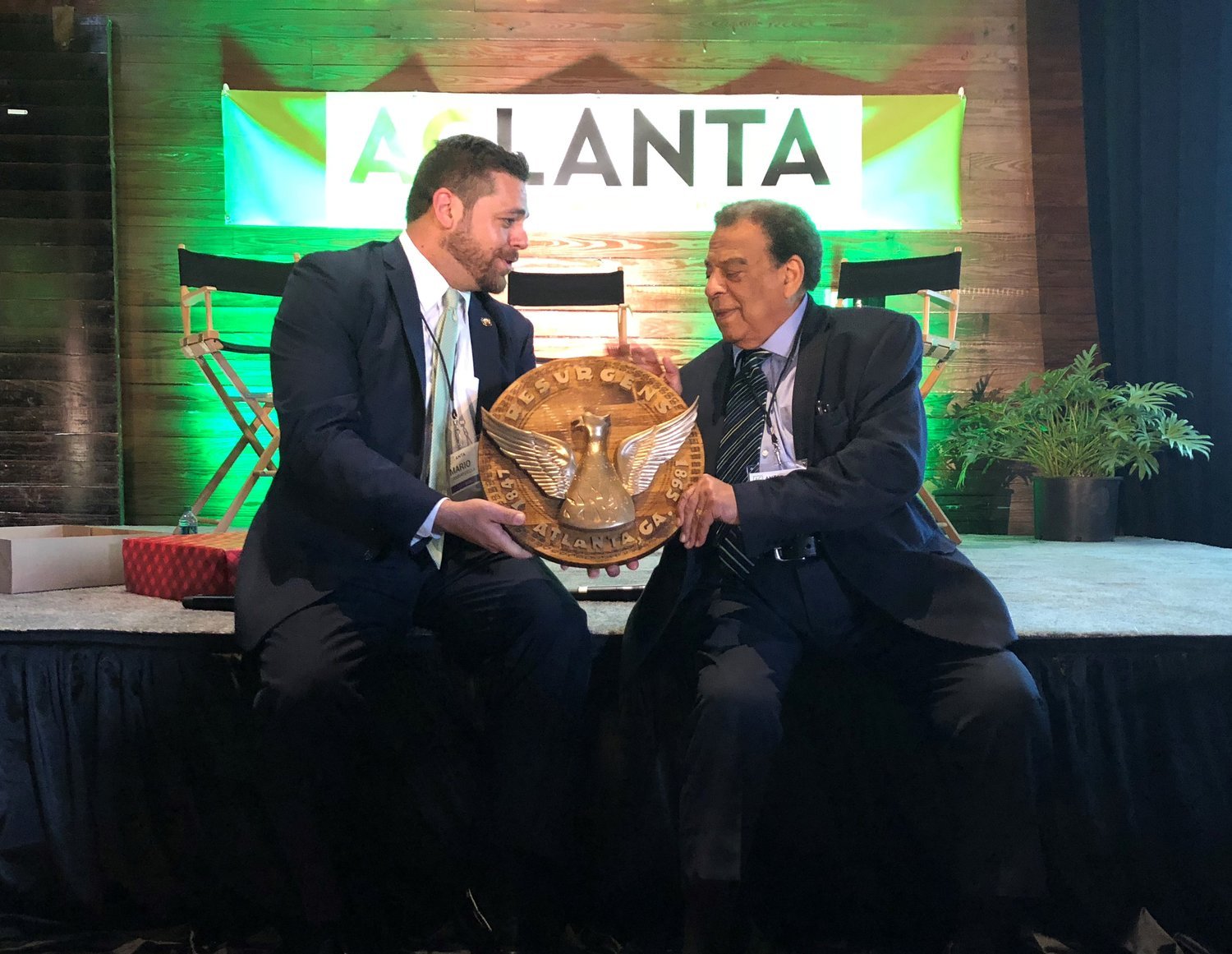Nov 19, 2019
Agritecture Exclusive: D.C. Set to Become 3rd Major US City to Hire a Director of Urban Agriculture
Written By: Ricky Stephens
When the City of Atlanta hired Mario Cambardella to be its “Director of Urban Agriculture” in 2015, it seemed like a novel idea. Indeed, it was - Cambardella became the first municipal staffer to hold this title out of any major city in the country. But speaking to Cambardella today, one has to wonder why an official post was such a novel idea in the first place.

Cambardella at the AgLanta Conference 2018 with civil rights leader and former ambassador Andrew Young.
“Food and food access...are fundamentally linked to issues such as health, equity, environmental sustainability and economic development,” explains Cambardella. On top of serving as a general “conduit” for the wide community of Atlanta’s farmers to reach municipal leadership, Cambardella holds a laundry list of crucial responsibilities: working with farmers on implementing environmentally sustainable practices; reducing costs related to site plans and permits; expanding access to farmers’ markets; assisting communities with the launch of retail markets and other food businesses; and ramping up farm-to-cafeteria programs -- all while remaining on the prowl for new and creative avenues to increase fresh food access. Examples have included fresh produce markets at metro stations, drastically discounted rides to and from supermarkets via a partnership with Lyft, the country’s largest urban food forest, and a focus on agriculture within the chamber of commerce’s IoT ATL initiative.
So perhaps it should come as no surprise that a third major American city, D.C., is now hiring for this position, after Philadelphia named Ashley Richards to the role earlier this year. Agritecture spoke with Katherine Antos, a Branch Chief at D.C.’s Department of Energy & Environment (DOEE) for further insights into this growing pattern of municipal support for urban agriculture, and how it relates to local issues in the District.
The most recent chapter of this story began five years ago with the passage of the D.C. Urban Farming and Food Security Act, which created a process to lease District-owned land to farming organizations as well as a tax abatement program for private property owners based on the portion of their property being used for agriculture. Both were exciting propositions. But years later, the implementation has sputtered, as the Washington City Paper reported in June. According to Antos, there was “broad recognition and support” amongst councilmembers, the mayor’s office, and several other departments that more assistance was needed. It was then Councilmember Mary Cheh - a strong local food system advocate - who successfully led efforts earlier this spring to identify funding and pass new legislation for the creation of an Office of Urban Agriculture.
Much of the focus for the new 1-person office will relate to goals laid out in the Sustainable DC 2.0 plan, crafted by D.C. Mayor Muriel Bowser. Those include putting 20 additional acres under cultivation in the District by 2032; developing food-producing landscaping on five acres of public space distributed throughout all eight wards; and supporting school gardens and garden-based food system education in public and charter schools.
For now, a major component of the work may be less characterized by putting hands in dirt and more so by putting pen to paper. Securing federal funds, including those made available specifically for urban production via the most recent Farm Bill, will be a critical activity that both Cheh and Antos highlighted. “I’m told there’s a lot of money we’ve been leaving on the table,” Cheh told the City Paper in June. And, as Antos pointed out, DOEE “is an agency that has a lot of experience [with] federal grants” - which, alongside the agency’s focus on providing technical assistance in overlapping areas such as soil testing and pollinator habitats, makes it an ideal place to house the new position.
Ona Balkus, Director of Food Policy in D.C.’s Office of Planning, believes another key element to the role is availability. “Having a champion within the government is so crucial,” explained Balkus - particularly when it’s a person who has technical expertise and understands the urgency that comes with certain issues on a farm. It’s a sentiment echoed by Cambardella back in Atlanta, who underscores the importance of gathering community input and eliminating unnecessary barriers for them.
Can a city’s embrace of urban agriculture, behind a 1-person office, really lead to substantial changes in the local food system? Katherine Antos believes so. “[We] took the mentality of: ‘the sky is the limit’ - what can we do with this office to really meaningfully support urban agriculture...to make the District more sustainable and resilient?” Balkus agrees. “I am really excited. With one dedicated staff person advocating for [farmers], I think we’re going to see an explosion in urban agriculture over the next 5-10 years.”
Further Reading
PHILADELPHIA NAMES FIRST URBAN AG DIRECTOR TO IMPLEMENT THE CITY'S URBAN AG PLAN

